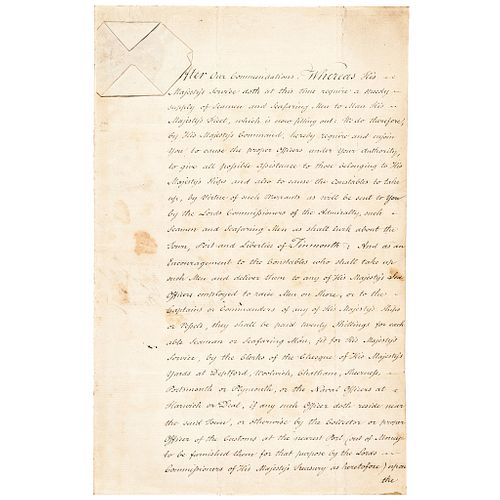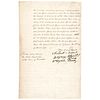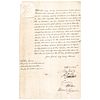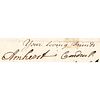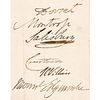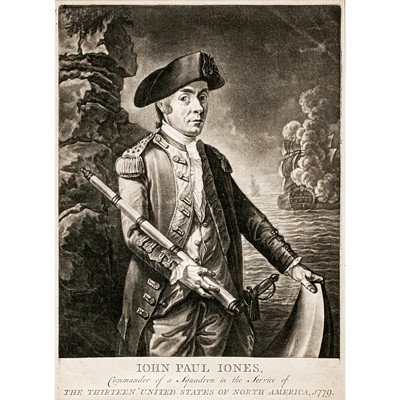1791 + 1793 British Naval IMPRESSMENT Related Letters One Signed JEFFREY AMHERST
Lot 1
Categories
Estimate:
$1,800 - $2,400
Absentee vs Live bid
Two ways to bid:
- Leave a max absentee bid and the platform will bid on your behalf up to your maximum bid during the live auction.
- Bid live during the auction and your bids will be submitted real-time to the auctioneer.
Bid Increments
| Price | Bid Increment |
|---|---|
| $0 | $10 |
| $200 | $20 |
| $300 | $25 |
| $500 | $50 |
| $1,000 | $100 |
| $2,000 | $200 |
| $3,000 | $250 |
| $5,000 | $500 |
| $10,000 | $1,000 |
| $20,000 | $2,000 |
| $30,000 | $2,500 |
| $50,000 | $5,000 |
| $100,000 | $10,000 |
| $200,000 | $20,000 |
| $300,000 | $25,000 |
| $500,000 | $50,000 |
About Auction
By Early American History Auctions
Jan 23, 2021
Set Reminder
2021-01-23 12:00:00
2021-01-23 12:00:00
America/New_York
Bidsquare
Bidsquare : Early American History Auction of Autographs, Americana, Political & Maps
https://www.bidsquare.com/auctions/early-american-history-auctions/early-american-history-auction-of-autographs-americana-political-maps-6311
311 Lots of Rare, Historic Autographs, Americana, Civil War Era, George Washington, Abraham Lincoln, Slavery & Black History, Revolutionary War Era, Colonial America, Federal Period, War of 1812, Colonial Currency, Indian Peace Medals & more... Early American History Auctions auctions@earlyamerican.com
311 Lots of Rare, Historic Autographs, Americana, Civil War Era, George Washington, Abraham Lincoln, Slavery & Black History, Revolutionary War Era, Colonial America, Federal Period, War of 1812, Colonial Currency, Indian Peace Medals & more... Early American History Auctions auctions@earlyamerican.com
- Lot Description
Autographs
Jeffery Amherst Signed British Naval Commander-in-Chief "Recruiting" (IMPRESSMENT) Letters - One by Amherst !
SIR JEFFERY AMHERST, 1st Baron Amherst KB (1717- 1797). British Army Commander-in-Chief of the Forces, best known for Britain's successful campaign to conquer the territory of New France during the Seven Years' War, captured the cities of Louisbourg, Quebec City and Montreal, becoming the first British Governor General in the territories that eventually became Canada.
Two different Letters dated in 1791 & 1793-Dated, Pair of Historical Content Manuscript British Naval Military Seamen "Recruiting" (IMPRESSMENT) Letters, each being Signed by different British Personages of note such as: "Amherst"; "Dorset"; "Montross"; "Salisbury"; and others, both Choice Very Fine. This rare pair of Handwritten Naval Seamen "Recruiting" Letters date to the period just following the American Revolution and the American Federal Period. The impressment of seamen from American ships caused serious tensions between Britain and the United States in the years leading up to the War of 1812. Both Letters contain similar Seamen "Recruiting" content. People liable to impressment were "eligible men of seafaring habits between the ages of 18 and 55 years". Non-seamen were impressed as well, though rarely. The initial passage begins: "After our commendations whereas his Majesty's service doth at this time require a speedy supply of seamen and seafaring men to man his Majesty's fleet, which is now fitting out."
1. The first Letter is dated April 8, 1791 and is addressed: "To our loving friends, the Chief Magistrates of the Town of Tinmouth," Signed, "Amherst" (Jeffery), and two others.
2. The second Letter is dated February 16, 1793 and addressed: "To His Grace - Hugh Duke of Northumberland, Lord Lieutenant of the County of Northumberland." Signed, "Dorset"; "Montross"; "Salisbury" and three others.
There are some differences in verbiage and the use of Constables and judges to force persons into impressment between the two documents, but many passages are quite identical. Each document has its full paper official Seal attached at the upper left adhered by wax, still intact. The first Document show some light scattered tone spots, but otherwise in nice condition. An amazing pair of requests to send out the "Constables" to find his Majesty's seamen! (2 items).
Impressment, colloquially, "the press" or the "press gang", refers to the act of taking men into a military or naval force by compulsion, with or without notice. Navies of several nations used forced recruitment by various means.
The large size of the British Royal Navy in the Age of Sail meant impressment was most commonly associated with Britain. It was used by the Royal Navy in wartime, beginning in 1664 and during the 18th and early 19th centuries as a means of crewing warships, although legal sanction for the practice goes back to the time of Edward I of England. The Royal Navy impressed many merchant sailors, as well as some sailors from other nations. People liable to impressment were "eligible men of seafaring habits between the ages of 18 and 55 years". Non-seamen were impressed as well, though rarely.
Impressment was strongly criticized by those who believed it to be contrary to the British constitution; at the time, unlike many of its continental rivals, British subjects were not subject to conscription for any other military service, aside from a brief experiment with army impressment from 1778 to 1780. Though the public opposed conscription in general, impressment was repeatedly upheld by the courts, as it was deemed vital to the strength of the navy and, by extension, to the survival of the realm.
Impressment was essentially a Royal Navy practice, reflecting the size of the British fleet and its substantial manpower demands. While other European navies applied forced recruitment in time of war this was generally as an extension of the practice of formal conscription applied to most European armies from the Napoleonic Wars on. The U.S. Continental Navy did however apply a form of impressment during the American War of Independence.
The impressment of seamen from American ships caused serious tensions between Britain and the United States in the years leading up to the War of 1812. After the defeat of Napoleon in 1814, Britain ended the practice; later conscription was not limited to the Royal Navy but covered all armed forces.
- Shipping Info
-
Early American provides in-house worldwide shipping. Please contact us directly if you have questions about your specific shipping requirements.
-
- Buyer's Premium



 EUR
EUR CAD
CAD AUD
AUD GBP
GBP MXN
MXN HKD
HKD CNY
CNY MYR
MYR SEK
SEK SGD
SGD CHF
CHF THB
THB